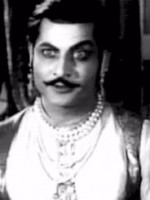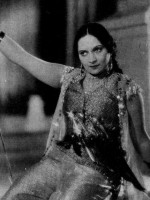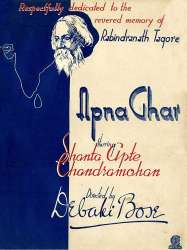Shanta Apte is a Actor born on 1 january 1916
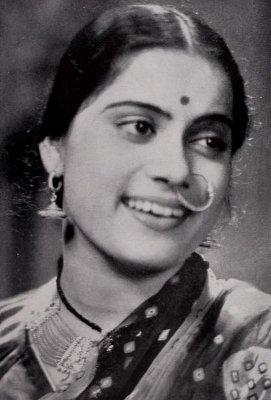
Shanta Apte (1916-1964) was an Indian singer-actress who worked in Marathi and Hindi cinema. Renowned for her roles in films like Duniya Na Mane/Kunku (1937) and Amar Jyoti (1936) under the Prabhat Films banner, she was active in Indian cinema from 1932-58. Apte's impact on Marathi cinema "paralleled" that of Kanan Devi's in Bengali cinema. Along with Kanan Devi, Apte is cited as one of the "great singing stars" from before the playback singing era. Apte began her career in films playing the role of a young Radha in the Marathi film Shyamsunder (1932). She joined Prabhat Films acting in her first Hindi language film Amrit Manthan in (1934).
She brought a change in the static style of song renditions in films with her "spontaneous gestures and eye movements". A "woman of rare mettle" she staged a hunger strike in 1939 at the Prabhat Studios gate following a disagreement regarding a clause in her contract. Cited as a "domestic guerrilla" following her roles in films like Kunku/Duniya Na mane, she became an inspirational role-model for a generation of college students.
Claimed to be the highest paid female screen star in Marathi-language cinema, her "star" status with the audiences as early as 1937 was acknowledged by the cine-magazine editor Baburao Patel in December 1937 issue of Filmindia, in an editorial titled "India Has No Star".
She was also one of the earliest Indian cinema actor to write her autobiography Jau Mi Cinemat (Should I join Films) in Marathi.
Ten years after Shanta Apte's death, actress Nayana Apte declared herself to be her daughter. Nayana claimed Apte married a distant cousin in 1947 and left him when she was three months pregnant. According to Vijay Ranchan in his book "Story of a Bollywood Song", in the section on Shanta Apte titled "The Rebel Commoner", Shanta was unmarried but had a daughter, the Marathi film and stage actress, Nayana Apte.
Source : Wikidata
Shanta Apte

- Infos
- Photos
- Best films
- Family
- Characters
- Awards
Birth name Shanta Apte
Birth 1 january 1916 (109 years)
Birth 1 january 1916 (109 years)
She brought a change in the static style of song renditions in films with her "spontaneous gestures and eye movements". A "woman of rare mettle" she staged a hunger strike in 1939 at the Prabhat Studios gate following a disagreement regarding a clause in her contract. Cited as a "domestic guerrilla" following her roles in films like Kunku/Duniya Na mane, she became an inspirational role-model for a generation of college students.
Claimed to be the highest paid female screen star in Marathi-language cinema, her "star" status with the audiences as early as 1937 was acknowledged by the cine-magazine editor Baburao Patel in December 1937 issue of Filmindia, in an editorial titled "India Has No Star".
She was also one of the earliest Indian cinema actor to write her autobiography Jau Mi Cinemat (Should I join Films) in Marathi.
Biography
Apte has been referred to as a woman who "symbolized women power both on and off the screen". According to K. A. Abbas, commenting on the vitriolic writings of the cine-magazine editor Baburao Patel of Filmindia, "there was only one example of a spirited star like Shanta Apte taking the law in our own hands when she came to Baburao's office and hit him with a cane…". She defied her contractual agreement with Prabhat Films when it hampered her from acting in outside films and decided to stage a fast in front of the studio gates. She was released from her contract by Prabhat Films.Ten years after Shanta Apte's death, actress Nayana Apte declared herself to be her daughter. Nayana claimed Apte married a distant cousin in 1947 and left him when she was three months pregnant. According to Vijay Ranchan in his book "Story of a Bollywood Song", in the section on Shanta Apte titled "The Rebel Commoner", Shanta was unmarried but had a daughter, the Marathi film and stage actress, Nayana Apte.
Usually with
Filmography of Shanta Apte (7 films)
Actor
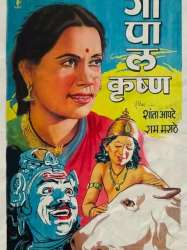
Gopal Krishna (1938)
, 2h12Genres Drama
Actors Ramchandra Purushottam Marathe, Shanta Apte
The story is based in Gokul where the young playful Krishna resides with his foster mother Yashodha and father Nanda. He tends cows along with other young cowherds. Gokul is ruled by the despotic King Kamsa who has Krishna’s real parents in custody. He is intent on killing Krishna to prevent the prophecy of his death trough Krishna coming true. Krishna incites the village people against Kamsa’s oppressive regime. He prevents 500 cows being sent to Kamsa who demands that the people of Gokul do so. He battles Kama’s General Keshi and defeats him when he is sent to kill him. The only miracle shown in the film is when Kamsa unleashes rain (unlike the other Puranic stories where the rain is brought about by the Rain God Indra) and Krishna lifts the Govardhan hill to shelter the people under it.
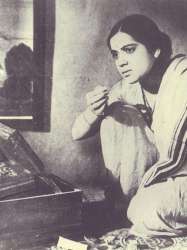
Kunku (1937)
, 2h46Directed by V. Shantaram
Origin Inde
Genres Drama
Themes Feminist films, Films about music and musicians, Musical films, Political films, Bollywood
Actors Shanta Apte
Roles Nirmala / Neera
Rating71%





The basic storyline revolves around a young woman, Nirmala (Shanta Apte) rebelling against her marriage to a much older widower, Kaka Saheb (Keshavrao Date), as was the practice in thosehe story is based on a novel by Shri. Narayan Hari Apte. It reminds us instinctively of the story of Sharada, a play by Deval which had long been a classic of Marathi theatre.
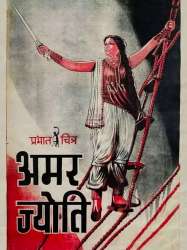
My Light (1936)
, 2h46Directed by V. Shantaram
Genres Drama, Action, Adventure, Musical
Actors Durga Khote, Chandra Mohan, Shanta Apte, Vasant Desai, Chandra Mohan
Roles Princess Nandini
Rating62%





Saudamini (Durga Khote) is denied custody of her son by the Queen (Karuna Devi) and the tyrannical Minister of Justice Durjaya (Chandra Mohan) after she separates from her husband. Durjaya tells her that a woman is the slave of her husband and essentially has no rights. This enrages Saudamini and she vows vengeance and becomes a pirate. She and her pirates capture a ship which is supposed to be carrying the princess Nandini (Shanta Apte). However, she finds her old enemy Durjaya and takes him prisoner cutting off one of his legs. Nandini has been hiding in chest, and when she comes out of it, the imprisoned Durjaya sees her. He falls in love with her and offers her his food. Nandini however falls in love with a young shepherd boy Sudhir (Nandrekar). When she meets Saudamini and her helper Rekha (Vasanti) she joins them as a pirate and tells Sudhir off. Durjaya escapes with the help of Sudhir and arrives to arrest Saudamini. Saudamini is captured but the others along with Nandini and Rekha escape. It is finally revealed that Sudhir is Saudamini's long-lost son. Nandini and Sudhir marry and Rekha carries forward Saudamini's legacy.
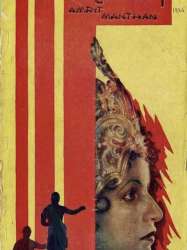
Amrit Manthan (1934)
, 2h35Directed by V. Shantaram
Actors Chandra Mohan, Chandra Mohan, Sureshbabu Mane, Shanta Apte
Roles Sumitra
Rating56%





The story is about a reformist king Kantivarma (Varde) who bans the sacrifice of animals and humans. This angers the fanatical Rajguru (Chandra Mohan), head priest of the Chandika cult. The cult meets secretly and the head priest orders the killing of the king. Yashodharma is chosen and though he hesitates, the priest orders him to do so. Yashodharma writes a note for his son before leaving that night telling him of the deed planned by the Rajguru. After the King is killed, Yashodharma (Kulkarni) is betrayed by the Rajguru in court and ordered to be killed. Yashodharma’s two children, Madhavgupt (Mane) and Sumitra (Shanta Apte), are on the run but Madhav is caught and the letter found on him by one of Rajguru’s men. Sumitra is taken prisoner and Rani Mohini (Nalin Tarkhud) who succeeds to the throne after her father’s death is asked to have Madhav sacrificed in the temple by the Rajguru. There is a storm and Mohini and Madhav escape to the forest. Madhav later goes in search of his sister. Vishwasgupt (Kelkar), a trusted minister tells Mohini and the people of Avanti about Rajguru being the real killer. The temple is thronged by townspeople demanding justice and the Rajguru with his obsessive belief in sacrifices offers himself to the goddess and cuts off his own head as a final sacrifice.
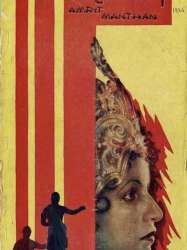
Amrit Manthan (1934)
, 2h35Directed by V. Shantaram
Actors Chandra Mohan, Chandra Mohan, Shanta Apte
Roles Sumitra 'Sume'
Rating56%





Considered a classic Indian film, Amrut Manthan depicts Chandika cult followers who meet in a dungeon. King Krantivarma (Varde) had banned human and animal sacrifices from what he perceived as increasingly fanatical festivals dedicated to the goddess. As a reaction to this, the cult's high priest (Chandra Mohan) orders the unfortunate Vishwagupta (Kelkar) to kill the king. He obeys, but is then betrayed by the priest and caught. His son Madhavgupta (Mane) and his daughter Sumitra (Apte) join forces with the princess (Nalini Tarkhad), and the people finally overthrow the priest.
 Connection
Connection

